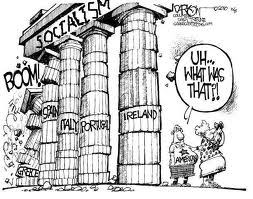How Should A Christian View Socialism?
Most philosophers through the centuries have believed that history is shaped by ideas, by human reason. But there is one famous philosopher who instead argued that the driving factor behind all of human history is economics. Karl Marx was born to German Jewish parents in 1818 and received his doctorate at age 23. He then embarked on a mission to prove that human identity is bound up in a person’s work and that economic systems totally control a person. Arguing that it is by his labor that mankind survives, Marx believed that human communities are created by the division of labor.
Marx studied history and concluded that people had for hundreds of years been more agriculturally oriented and that society had been based on agrarianism. But the Industrial Revolution was a game–changer, in Marx’s mind, because those who had freely worked for themselves were now forced by economics to work in factories instead. This, Marx felt, stripped away their dignity and identity because their labor defined who they were, and now they were reduced to mere slaves controlled by a powerful taskmaster. This perspective meant that the economics of capitalism was the natural enemy-of-Marx.
Marx surmised that capitalism emphasized private property and, therefore, reduced ownership to the privileged few. Two separate “communities” emerged in Marx’s mind: the business owners, or the bourgeoisie; and the working class, or the proletariat. According to Marx, the bourgeoisie use and exploit the proletariat with the result that one person’s gain is another person’s loss. Moreover, Marx believed that the business owners influence the lawmakers to ensure their interests are defended over the workers’ loss of dignity and rights. Last, Marx felt that religion is the “opiate of the masses” which the rich use to manipulate the working class; the proletariat are promised rewards in heaven one day if they keep working diligently where God has placed them (i.e., subservient to the bourgeoise).
In the earthly utopia Marx envisioned, the people collectively own everything and all work for the common good of mankind. Marx’s goal was to end the ownership of private property through the state’s ownership of all means of economic production. Once private property was abolished, Marx felt that a person’s identity would be elevated and the wall that capitalism supposedly constructed between the owners and working class would be shattered. Everyone would value one another and work together for a shared purpose.
However, There Are At Least Four Errors In Marx’s Thinking.
First, his assertion that another person’s gain must come at another person’s expense is a myth; the structure of capitalism leaves plenty of room for all to raise their standard of living through innovation and competition. It is perfectly feasible for multiple parties to compete and do well in a market of consumers who want their goods and services.
Second, Marx was wrong in his belief that the value of a product is based on the amount of labor that is put into it. The quality of a good or service simply cannot be determined by the amount of effort a laborer expends. For example, a master carpenter can more quickly and beautifully make a piece of furniture than an unskilled craftsmen can, and therefore his work will be valued far more (and correctly so) in an economic system such as capitalism. As Margaret Thatcher said, “The problem with socialism is that eventually you run out of other people’s money.”
Third, Marx’s theory necessitates a government that is free from corruption and negates the possibility of elitism within its ranks. If history has shown anything, it is that power corrupts fallen mankind, and absolute power corrupts absolutely. A nation or government may kill the idea of God, but someone will take God’s place. That someone is most often an individual or group who begins to rule over the population and seeks to maintain their privileged position at all costs. Basic human nature is the basic problem with all basic economic theories. The prophet Jeremiah succinctly put it this way, “The heart is deceitful above all things, And desperately wicked; Who can know it?” No race or creed or color or class or bourgeois, or laborer or academic or government, or nation, or philosopher is exempt from basic selfishness.
Fourth and just as important, Marx was wrong that a person’s identity is bound up in the work that he does. Although secular society certainly forces this belief on nearly everyone, the Bible says that all have equal worth because all are created in the image of the eternal God. That is where true, intrinsic human value lies.
Was Marx right? Is economics the catalyst that drives human history? No, what directs human history is the Creator of the universe who controls everything, including the rise and fall of every nation. In addition, God also controls who is put in charge of each nation, as Scripture says, “The Most High is ruler over the realm of mankind, and bestows it on whom He wishes and sets over it the lowliest of men” (Daniel 4:17). Further, it is God who gives a person skill at labor and the wealth that comes from it, not the government: “Here is what I have seen to be good and fitting: to eat, to drink and enjoy oneself in all one’s labor in which he toils under the sun during the few years of his life which God has given him; for this is his reward. Furthermore, as for every man to whom God has given riches and wealth, He has also empowered him to eat from them and to receive his reward and rejoice in his labor; this is the gift of God” (Ecclesiastes 5:18–19).
That’s Something To Think About!
Pastor Bob
